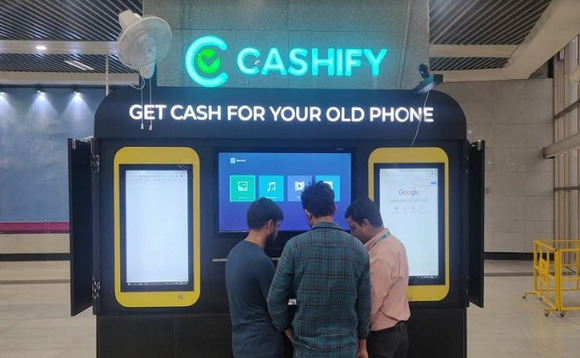
Deal focus: Novel angle on mobile adoption gains traction

Cashify is leveraging and propelling India’s mobile penetration narrative at the most fundamental level. Adding tech to the secondhand smart phone space has allowed it to create a first-of-its-kind brand
India's Cashify, a used smart phone reseller set up in 2009, has maintained a robust, international shareholder base since its earliest funding rounds about seven years ago, but the company has always remained prudent in terms of cashing up. Its largest investment up to last year was a USD 15m Series D round from Olympus Capital Asia.
The USD 90m Series E is therefore a step-change, aimed at carrying out some expensive growth initiatives. These include building brand awareness through advertising (Bollywood ambassadors are already onboard) and doubling the purchasing of 100,000 unwanted phones a month from the doorsteps of people who don't even know such a service exists.
Even so, an element of frugality remains. Much of the Series E comprised of secondary shares courtesy of exiting Chinese investors. Historically, the likes of Shunwei Capital, 5Y Capital, CDH Investments, and Aihuishou have backed Cashify.
Secondaries specialist NewQuest Capital Partners, which co-led the round alongside Prosus Ventures, declined to comment on specifics. But it is tracking an uptick in the opportunity around Chinese exits in India amid bilateral tensions. NewQuest currently attributes about 25% of its deal flow in the country to this phenomenon, compared to 10-20% in the first half of last year.
"Previously, it was due to uncertainties. Now, it's also the fact that a lot of Chinese investors have been invested in Indian companies for 4-7 years, so it's just a logical time for them to exit," said Amit Gupta, NewQuest's head of India.
It comes at a time of transition for Cashify, which has historically operated online but is quickly adapting to the offline realities of its target segment. People buying used smart phones – among them India's 100m feature phone users looking to upgrade – are naturally circumspect about quality and gravitate toward the peace of mind that comes with a boxed device that can be inspected at a physical location.
Last year, the company opened more than 150 brick-and-mortar locations in 51 cities, and it plans to double this footprint by the end of the 2023 financial year. These locations, which include kiosks as well as larger stores, sell under the PhonePro brand, which has a six-month warranty.
The expansion is not expected to be cash-intensive on a store-by-store basis; new locations are said to break even in about six months. Cashify hopes to break even at the company level in the next 3-4 quarters, double revenue to about INR 13bn (USD 165m) by 2023, and generate positive EBITDA in the next financial year.
PhonePro is positioned as a like-new certification grade that involves high-tech diagnostics and refurbishment processes. More than 50 software and hardware tests are run on each phone, which is ready for resale within 1-2 days with all its accessories intact. They sell at significant discounts. A recent iPhone model, for example, can retail for about half the listed price on Amazon.
"You can theoretically repair anything by replacing all the components, but the cost will be higher. Cashify provides real-time input to each of its engineers doing repairs about their productivity and various KPIs [key performance indicators]," said Mamtesh Sugla, a director at NewQuest.
"They are able to track the cost per device that they're refurbishing and data points like the average cost of spare parts they need. And all of that is automated. We were quite impressed."
The emphasis on ambitious technology in what appears to be simple used goods model is closely related to the short lifespan of smart phones and the idea that inventory needs to be moved quickly before it is too outdated. In addition to artificial intelligence-enabled diagnostics, Cashify's technology moat includes a data-driven pricing system and business vertical allocation algorithm.
Inventory that is not cleared to be marketed as PhonePro product is sold on to other retailers through a marketplace called SuperSale. The B2B business generates significant data for demand-side analytics that inform pricing and which kinds of phones should be prioritised for the consumer-facing strategy.
"Of course, the basic instinct of any used phone user is, ‘I don't know if this is going to work or not.' That's why you have to make the whole experience better," Gupta added. "You need to ensure that the user thinks of it as a fresh phone that provides the same kind of experience as a new phone – except for the price."
Latest News
Asian GPs slow implementation of ESG policies - survey
Asia-based private equity firms are assigning more dedicated resources to environment, social, and governance (ESG) programmes, but policy changes have slowed in the past 12 months, in part due to concerns raised internally and by LPs, according to a...
Singapore fintech start-up LXA gets $10m seed round
New Enterprise Associates (NEA) has led a USD 10m seed round for Singapore’s LXA, a financial technology start-up launched by a former Asia senior executive at The Blackstone Group.
India's InCred announces $60m round, claims unicorn status
Indian non-bank lender InCred Financial Services said it has received INR 5bn (USD 60m) at a valuation of at least USD 1bn from unnamed investors including “a global private equity fund.”
Insight leads $50m round for Australia's Roller
Insight Partners has led a USD 50m round for Australia’s Roller, a venue management software provider specializing in family fun parks.







